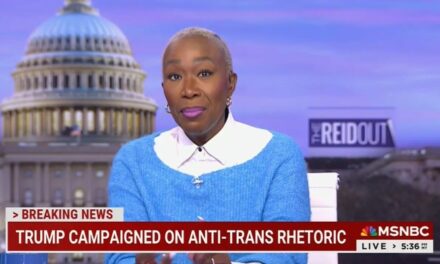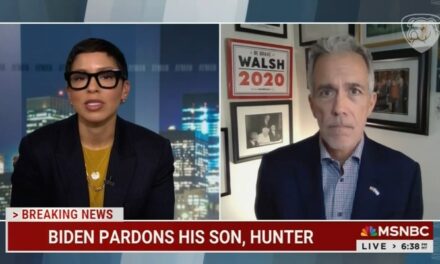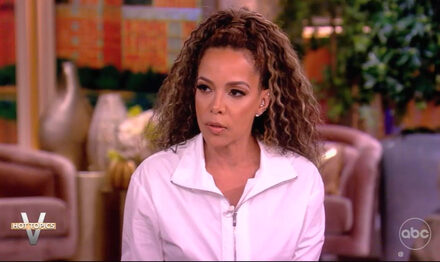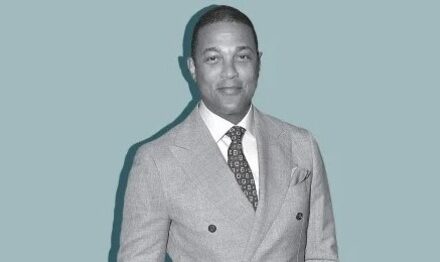We support our Publishers and Content Creators. You can view this story on their website by CLICKING HERE.
Even with former President Jimmy Carter’s passing over the weekend, Monday’s CBS Mornings still wanted their dose of President-elect Trump. So, while liberal co-host Tony Dokoupil was speaking with anti-Trump presidential historian Douglas Brinkley, the former teed up the latter to recount how Carter had supposedly “guilted” Trump into making a gift to the Carter Center, much to the amusement of all the liberals on set. But there didn’t seem to be any evidence that Trump had written them a check.
“Well, he wasn’t afraid of criticizing the former presidents, right? He didn’t think George H.W. Bush should have gone into Iraq, he thought Obama was wrong on surveillance issues, I mean, you name it,” Dokoupil said. To which Brinkley noted that Carter was “not part of that presidents’ club in those ways.”
Brinkley then recalled a conversation he purportedly had with Trump at Mar-a-Lago about a time when Carter had asked Trump for some money for the Carter Center:
But I once got to talk to Donald Trump at Mar-a-Lago and asked him about presidents of his life. And I said, what do you think, Mr. Trump, but Jimmy Carter? And he said, ‘he’s not my cup of tea.’ And I said, ‘well, what do you mean not your cup of tea? Do you know him?’ He immediately said, “Yeah, I got to spend time with him once.” He said, “I was trashing Carter everywhere, and you know, beats saying what a failure he is, worst president ever. I got a call that he wanted to see me. And I thought, ‘Oh, I’m going to get an earful of it now.” Carter showed up with the Secret Service, this is his ex-president. And he — and immediately Carter said to Trump, “Now, I’m trying to save lives around the world, you know with the guinea worm and we’re doing this at the Carter Center. And I need a substantial gift of money from you.
“He guilted him,” boasted co-host Michelle Miller as they all busted out laughing. “He guilted him,” Brinkley agreed. “I love it. I love it,” added Dokoupil.
But while CBS tried to make it seem as though Trump had given the Carter Center “a substantial gift of money,” the facts don’t seem to support it.
In a 2015 Washington Post article titled “The time Jimmy Carter asked Donald Trump for $5 million,” the paper quoted an excerpt of Trump’s Art of the Deal where he told a similar story:
After he lost the election to Ronald Reagan, Carter came to see me in my office. He told me he was seeking contributions to the Jimmy Carter Library. I asked how much he had in mind. And he said, “Donald, I would be very appreciative if you contributed five million dollars.”
But the article included a critical detail, where Trump wrote: “I was dumbfounded. I didn’t even answer him.”
Trump’s non-answer to Carter was also noted in the City Journal’s obituary for Carter:
In the early 1980s, Carter visited the real estate developer and future president Donald Trump in New York and asked him to contribute $5 million to the Carter Center. Trump was startled by the ex-president’s chutzpah and hardly bothered to answer. But he admitted later that he admired the ambition and even the gall of the request.
So it appears that the money requested was more for the founding of the Carter Library and not the Carter Center’s later charity works oversees, as CBS framed it. And while they boated that Trump was “guilted” into giving money, it didn’t seem as though a check was written. The Carter Center doesn’t list Trump as one of their “Funding Partners.” CBS also made it seem as though the guilting happened much more recently than the in 1980s as Trump wrote about it.
The transcript is below. Click “expand” to read:
CBS Mornings
December 30, 2024
7:13:14 a.m. Eastern(…)
TONY DOKOUPIL: It was once said that Jimmy Carter is the only person in history to use the White House as a stepping stone for greatness because of all that he did after. And it seemed as though because of only four years in office he was making up for something. He was very busy. What would he want his legacy to be today?
DOUGLAS BRINKLEY: I think that he won a Nobel Peace Prize which represents for him all the work he did at stopping civil wars around the world, of monitoring free and fair elections, of combating river blindness, guinea worm disease, tuberculosis, leprosy, you name it.
It’s interesting, Carter as ex-president, wanted to destroy a disease, he didn’t — wasn’t somebody who was going into cancer research and finding new ways and more improved technology. He just wanted to wipe it out.
DOKOUPIL: He was competitive, right? He had an edge.
BRINKLEY: The key to him, super competitive. In fact, I spent some time talking to President Carter in Plains about all presidents. And FDR had a big impact on him because FDR was in a wheelchair right there at the Little White House was in Georgia, down the country road from Plains. So, when you’re a kid in the Depression, FDR’s in town. And then he loved Harry Truman, the directness of Truman. And I think because Truman was also a Baptist, and Carter was, and really a southern Baptist from Missouri.
But the — he didn’t get along with most of the other presidents. Now, Gerry Ford became his closest friend, the person he beat in 1976. So, now they can be friends.
DOKOUPIL: Well, he wasn’t afraid of criticizing the former presidents, right? He didn’t think George H.W. Bush should have gone into Iraq, he thought Obama was wrong on surveillance issues, I mean, you name it.
BRINKLEY: And he not part of that presidents club in those ways. He did a lot during Bush 41 because of his friendship with James Baker, which is based on hunting, Quayle hunting, and Christianity.
But I once got to talk to Donald Trump at Mar-a-Lago and asked him about presidents of his life. And I said, what do you think, Mr. Trump, but Jimmy Carter? And he said, ‘he’s not my cup of tea.’ And I said, ‘well, what do you mean not your cup of tea? Do you know him?’ He immediately said, “Yeah, I got to spend time with him once.” He said, “I was trashing Carter everywhere, and you know, beats saying what a failure he is, worst president ever. I got a call that he wanted to see me. And I thought, ‘Oh, I’m going to get an earful of it now.” Carter showed up with the Secret Service, this is his ex-president. And he — and immediately Carter said to Trump, “Now, I’m trying to save lives around the world, you know with the guinea worm and we’re doing this at the Carter Center. And I need a substantial gift of money from you.”
[Laughter]
DOKOUPIL: I love that.
MICHELLE MILLER: He guilted him.
BRINKLEY: He guilted him. And Trump said, “That’s the first time I ever figured out how he became president. Because he was this Jimmy who was ’76. Trump didn’t get the cut of his jib, you know, and suddenly he had the nerve to come in my office when I’m trashing him and make me feel guilty about giving money to the Carter Center.”
DOKOUPIL: I love it. I love it.
MILLER: Can we talk about his civil rights record? Because so much of it came just before his win at the White House and the certainly long after.
BRINKLEY: Keep in mind coming out of Georgia politics, Jimmy Carter’s — there is no photo of Carter with Martin Luther King Jr. He stayed away from him. It would have been toxic for Carter to have got — one governor. But he did promise in 1970 to David Rabahan, his backer who was Jewish and had his office of the Southern Christian Leadership Conference. He told him David, who had been giving him use of the private plane around the states, probably too much so; ‘If I become governor, I will say it’s time to end segregation now.’
And he lived up to his word and got sworn in as governor. And he said it, and it made the cover of TIME magazine because David Rockefeller and the Unilateral Commission was looking for a southerner to put on the commission, Kissinger was on it, you know, Japan, Germany, U.S. currency, stuff. And now Carter became the token southerner in the eastern establishment.
DOKOUPIL: You know, Carter once said that if he had any regrets it would have been to send one more helicopter to Iran to rescue the hostages. They would have gotten them out, and he would have been re-elected. And that’s what he said. Do you think that’s true? Do you think that’s what made the difference for him?
BRINKLEY: He used it as a joke line, but I do think it’s true. But a critic of Carter in that moment. You know, he wanted rubber bullets used on that rescue. So, he wanted no deaths. So, we were going to land people and be able to knock out people at the embassy to bring our people home, because he wanted no blood on his hands. There is an overlapping of Carter’s very — the important role of Christ in his life.
DOKOUPIL: Yes.
BRINKLEY: And what does that mean for a sitting president. And he’s most proud that he didn’t get us into a foreign war, as he would tell me, “Look, I could have bombed Tehran and been on the news in America at war, but we would have had a death toll. My way of doing it was slow, but in the end all the hostages got released.”
DOKOUPIL: Christianity did guide his life.

 Conservative
Conservative  Search
Search Trending
Trending Current News
Current News 





